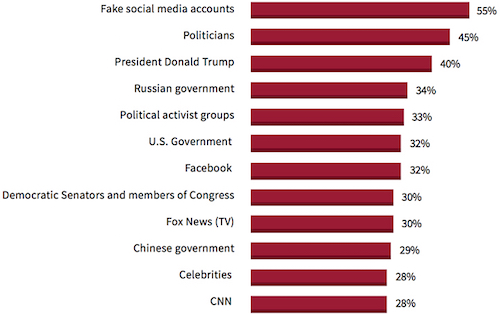A majority of Americans now consider the spread of disinformation in the country to be a “major” problem, according to a report from the Institute for Public Relations.
The IPR report, which explored current trust in the media as well as the perceived prevalence of misleading or biased information, found that an overwhelming majority of Americans (86 percent) now consider fake news to be a problem in the U.S. Nearly two-thirds (63 percent) now see disinformation as a “major” problem in society, on par with gun violence (63 percent) and just below terrorism (66 percent).
More than half of respondents (51 percent) said they now encounter disinformation at least once a day, while 78 percent reported seeing it once a week and 89 percent said they see it once a month.
 Top 12 sources responsible for spreading disinformation. Top 12 sources responsible for spreading disinformation. |
Americans’ newfound skepticism in the media has had palpable effects: fewer than one in four respondents now profess having “a lot” of trust in any single news source.
A majority of Americans cite fake social media accounts as the source most responsible for spreading fake news (55 percent). Politicians followed (45 percent) as did, specifically, President Trump (40 percent). The Russian government took fourth place (34 percent) followed by political activist groups (33 percent). Nearly a third (32 percent) blamed Facebook, which was the only social media platform to appear by name in the list.
As it turns out, the PR industry takes its share of the blame as a party viewed as responsible for sharing disinformation: 65 percent said marketers and advertisers were “very” responsible for spreading disinformation, and 58 percent said the same about PR professionals. Only about a quarter of Americans (26 percent) said they maintain some trust in PR practitioners to provide accurate news and information.
Among media outlets, Fox News (30 percent) and CNN (28 percent) were cited most often for being the most responsible for spreading disinformation. Political party lines were clearly a factor in respondents’ answers here: 41 percent of respondents identifying as Democrats blamed Fox for spreading disinformation, while 47 percent of Republicans blamed CNN for the same deed.
Paradoxically, the parties seen as least responsible for sharing fake news in the U.S. were the respondents themselves. Only 11 percent of respondents said “people like me” were responsible for sharing fake news, and only 11 percent believe their families do so. In fact, nearly a third (31 percent) cited family members as an information source they trust “a lot.” Other trustworthy sources included Internet search engines, local newspapers and local broadcasters.
Opinions were also divided concerning who should be responsible for combatting disinformation in society and how good of a job those parties are presently doing to fight it. A majority of Americans (72 percent) think Trump should be responsible for combatting disinformation, though only 36 percent believe he’s doing “somewhat” well in any efforts to do anything about the problem. The U.S. government was cited by 70 percent—though only 33 percent think it’s making a worthwhile effort to combat disinformation—followed by Congress (at 67 percent, with a 29 percent approval rating). News organizations and PR pros were cited by 64 percent and 56 percent, respectively. More than three-quarters (79 percent) believe the PR industry should do something to combat disinformation, but only 30 percent believe that sector is doing at least “somewhat” well in its efforts to do so.
When it comes to who Americans think are doing the best job to combat misinformation, once again that award goes to the respondents themselves. More than half of those polled (55 percent) think they and people like them are making the most effort to fight fake news. Slightly more than half (51 percent) cited the Supreme Court, followed by fact-checking sites such as Politifact and Snopes.
Nearly half of those polled (47 percent) said they often consult other sources to ensure the news they see is accurate and true.
IPR’s “Disinformation in Society Report” was authored by IPR President and CEO Dr. Tina McCorkindale. The report surveyed 2,200 U.S. adults in March. Polling was conducted by digital politics and policy outlet The Morning Consult.
IPR is a non-profit organization based at the University of Florida.


 Real Chemistry has hired Wunderman Thompson’s Andy Johnson as chief information officer.
Real Chemistry has hired Wunderman Thompson’s Andy Johnson as chief information officer. The communications industry is often so caught up in the role of measurement that it loses sight of arguably the most important component in the measurement mix—the client’s bottom line.
The communications industry is often so caught up in the role of measurement that it loses sight of arguably the most important component in the measurement mix—the client’s bottom line. Imre has recruited Atul Sharma, who was VP-analytics at Porter Novelli, for the senior VP-intelligence slot.
Imre has recruited Atul Sharma, who was VP-analytics at Porter Novelli, for the senior VP-intelligence slot. Some of the ways in which analytics and artificial intelligence are transforming today’s communications landscape.
Some of the ways in which analytics and artificial intelligence are transforming today’s communications landscape. Edelman has launched a disinformation offering to help clients combat deceptive and false material with fact-based communications.
Edelman has launched a disinformation offering to help clients combat deceptive and false material with fact-based communications.


 Have a comment? Send it to
Have a comment? Send it to 
No comments have been submitted for this story yet.